2023中考英语二轮复习虚拟语气课件(共65张PPT)
文档属性
| 名称 | 2023中考英语二轮复习虚拟语气课件(共65张PPT) |

|
|
| 格式 | zip | ||
| 文件大小 | 855.7KB | ||
| 资源类型 | 教案 | ||
| 版本资源 | 通用版 | ||
| 科目 | 英语 | ||
| 更新时间 | 2023-04-26 00:00:00 | ||
图片预览

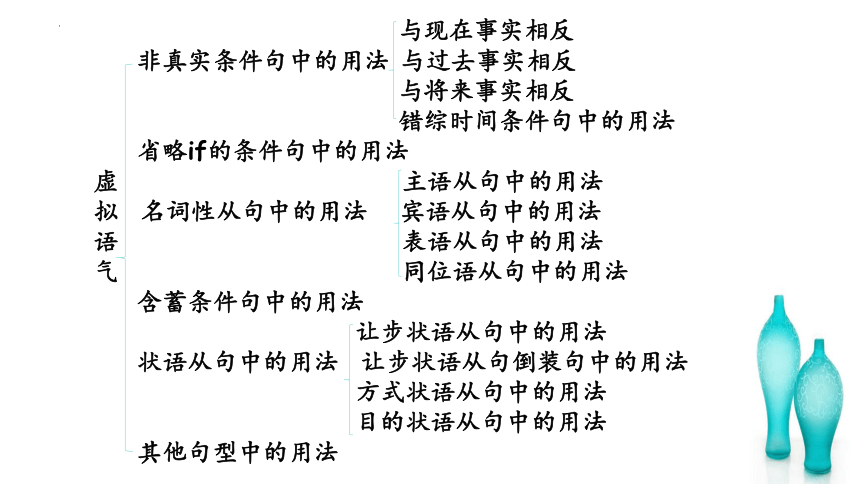
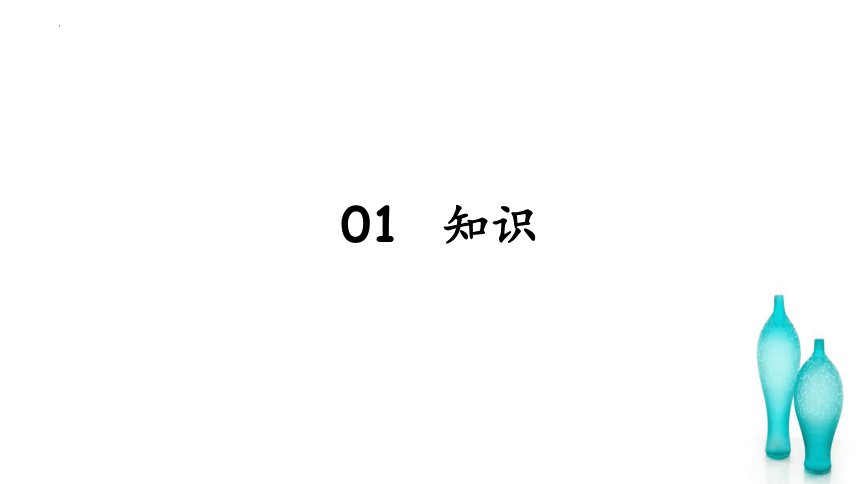
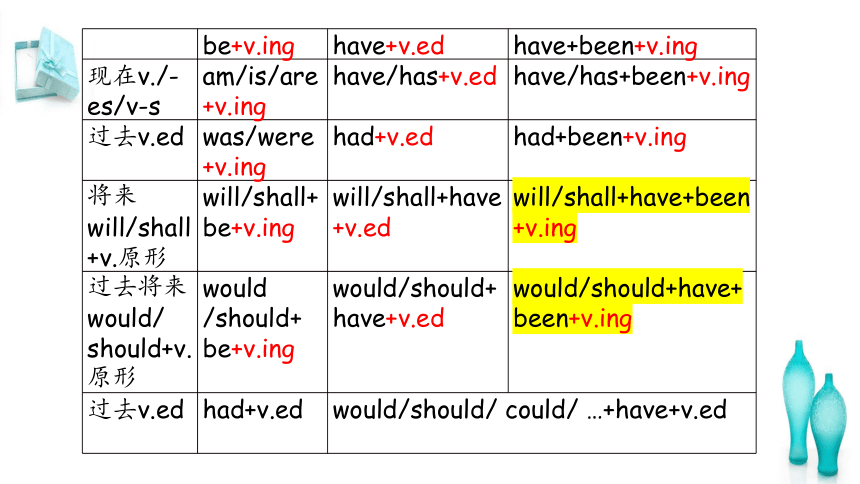
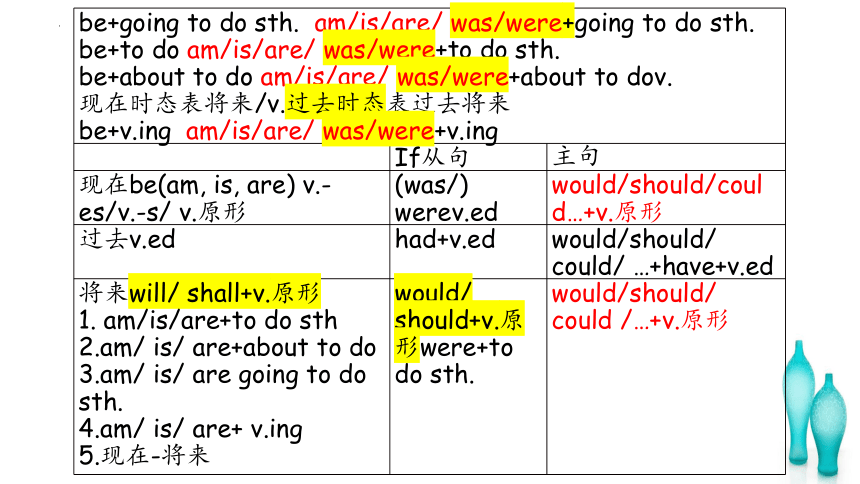

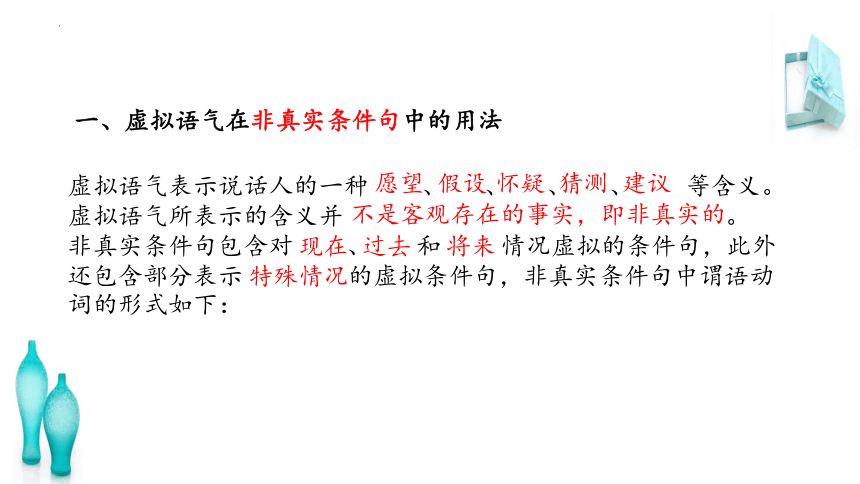

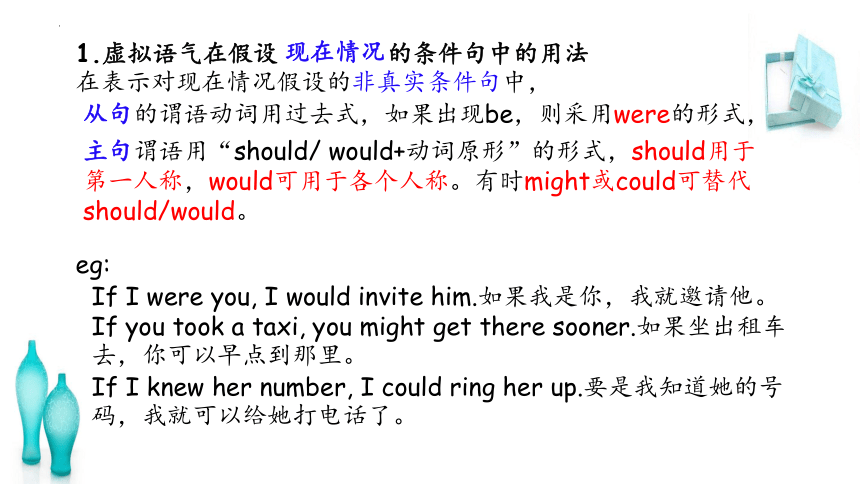
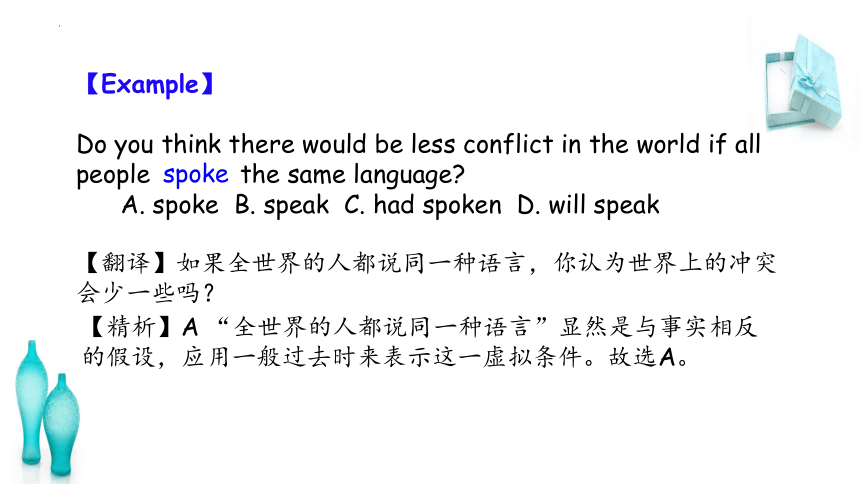

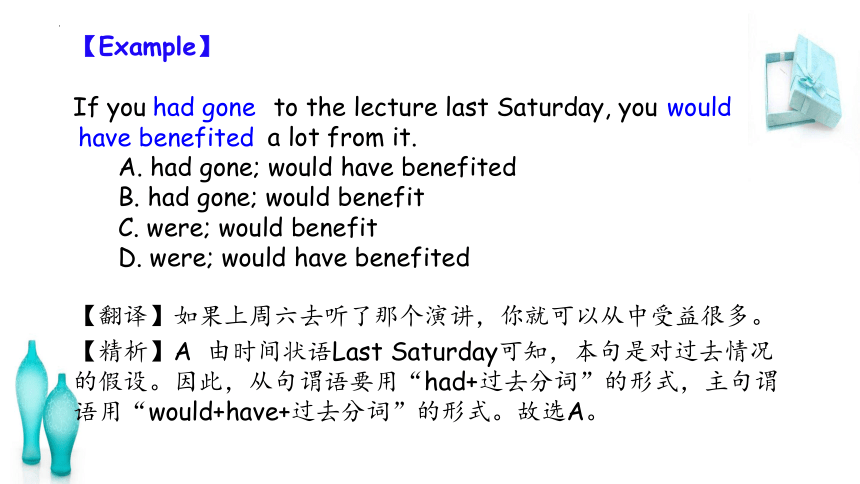
文档简介
(共65张PPT)
虚拟语气
与现在事实相反
非真实条件句中的用法 与过去事实相反
与将来事实相反
错综时间条件句中的用法
省略if的条件句中的用法
虚 主语从句中的用法
拟 名词性从句中的用法 宾语从句中的用法
语 表语从句中的用法
气 同位语从句中的用法
含蓄条件句中的用法
让步状语从句中的用法
状语从句中的用法 让步状语从句倒装句中的用法
方式状语从句中的用法
目的状语从句中的用法
其他句型中的用法
01 知识
be+v.ing have+v.ed have+been+v.ing
现在v./-es/v-s am/is/are+v.ing have/has+v.ed have/has+been+v.ing
过去v.ed was/were+v.ing had+v.ed had+been+v.ing
将来will/shall +v.原形 will/shall+be+v.ing will/shall+have+v.ed will/shall+have+been+v.ing
过去将来would/ should+v.原形 would /should+ be+v.ing would/should+have+v.ed would/should+have+been+v.ing
过去v.ed had+v.ed would/should/ could/ …+have+v.ed
be+going to do sth. am/is/are/ was/were+going to do sth. be+to do am/is/are/ was/were+to do sth. be+about to do am/is/are/ was/were+about to dov. 现在时态表将来/v.过去时态表过去将来 be+v.ing am/is/are/ was/were+v.ing
If从句 主句
现在be(am, is, are) v.-es/v.-s/ v.原形 (was/) werev.ed would/should/could…+v.原形
过去v.ed had+v.ed would/should/ could/ …+have+v.ed
将来will/ shall+v.原形 1. am/is/are+to do sth 2.am/ is/ are+about to do 3.am/ is/ are going to do sth. 4.am/ is/ are+ v.ing 5.现在-将来 would/ should+v.原形were+to do sth. would/should/ could /…+v.原形
02 理论
区别 条件从句 主句
与现在事实相反 If+主句+过去式(be用were) 主语+should/would/could/might+动词原形
与过去事实相反 If+主语+had+过去分词 主语+should/would/could/might+have+动词过去分词
与将来事实相反 If+主语+过去式(be用were)If+主语+should+动词原形If+主语+were to+动词原形 主语+should/would/could/might+动词原形
虚拟语气表示说话人的一种 、 、 、 、 等含义。虚拟语气所表示的含义并 。
非真实条件句包含对 、 和 情况虚拟的条件句,此外还包含部分表示 的虚拟条件句,非真实条件句中谓语动词的形式如下:
愿望
假设
怀疑
猜测
建议
不是客观存在的事实,即非真实的
现在
过去
将来
特殊情况
一、虚拟语气在非真实条件句中的用法
区别 条件从句 主句
与现在事实相反 If+主句+过去式(be用were) 主语+should/would/could/might+动词原形
与过去事实相反 If+主语+had+过去分词 主语+should/would/could/might+have+动词过去分词
与将来事实相反 If+主语+过去式(be用were)If+主语+should+动词原形If+主语+were to+动词原形 主语+should/would/could/might+动词原形
区别 条件从句 主句
与现在事实相反 If+主语+过去式(be用were) 主语+should/ would/ could/ might+动词原形
与过去事实相反 If+主语+had+过去分词 主语+should/ would/ could/ might+have+动词过去分词
与将来事实相反 If+主语+过去式(be用were) If+主语+should+动词原形 If+主语+were to+动词原形 主语+ should/ would/ could/ might+动词原形
eg: If I were you, I should study English.
eg: If you had taken my advice, you wouldn’t have failed in the exam.
eg: If it were to rain tomorrow, the meeting would be put off.
1.虚拟语气在假设 的条件句中的用法
在表示对现在情况假设的非真实条件句中,
eg:
现在情况
从句的谓语动词用过去式,如果出现be,则采用were的形式,
主句谓语用“should/ would+动词原形”的形式,should用于第一人称,would可用于各个人称。有时might或could可替代should/would。
If I were you, I would invite him.如果我是你,我就邀请他。
If you took a taxi, you might get there sooner.如果坐出租车去,你可以早点到那里。
If I knew her number, I could ring her up.要是我知道她的号码,我就可以给她打电话了。
【Example】
Do you think there would be less conflict in the world if all people the same language
A. spoke B. speak C. had spoken D. will speak
【翻译】如果全世界的人都说同一种语言,你认为世界上的冲突会少一些吗?
spoke
【精析】A “全世界的人都说同一种语言”显然是与事实相反的假设,应用一般过去时来表示这一虚拟条件。故选A。
2.虚拟语气在假设 的条件句中的用法
在表示对过去情况假设的非真实条件句中,
eg:
过去情况
从句的谓语动词用过去完成式,即“had+过去分词”的形式,
主句谓语用“should/ would/ could/ might+have+过去分词”的形式,should用于第一人称,would可用于各个人称。
If she had had time, she would have been there with you.她要是有时间,就和你一起去了。
If I had known the answer, I should/ would/ could/ might have told him.要是我知道答案的话,我就告诉他了。
If we had found him earlier, we could have saved his life.要是我们早点找到他的话,我们就可以救活他。
【Example】
If you to the lecture last Saturday, you
a lot from it.
A. had gone; would have benefited
B. had gone; would benefit
C. were; would benefit
D. were; would have benefited
【翻译】如果上周六去听了那个演讲,你就可以从中受益很多。
had gone would have benefited
【精析】A 由时间状语Last Saturday可知,本句是对过去情况的假设。因此,从句谓语要用“had+过去分词”的形式,主句谓语用“would+have+过去分词”的形式。故选A。
3.虚拟语气在假设 的条件句中的用法
在表示对将来情况假设的非真实条件句中,
eg:
将来情况
从句的谓语动词用过去式或者“should/ were to+动词原形”的习惯上,
主句谓语用“should/ would/ could/ might+动词原形”的形式。在主句中should用于第一人称,would可用于各个人称。
If there were a heavy snow next Sunday, we would go skiing.如果下周日下大学额,我们就去滑雪。
If I asked him, he would/ could help us.如果我请求他,他会帮助我们的。
If there should/ were to be something wrong, they would/ could/ might tell you at once.如果有什么问题,他们会马上告诉你的。
【Example】
If she here next Monday, I would tell her about the matter.
A. had been B. were to be C. would be D. were
【翻译】如果她下周一来这里的话,我会告诉她这件事。
were to be
【精析】B 根据句中的时间状语next Monday和主句中的would tell可知,本句是对将来情况的假设,从句谓语动词应用“should/ were to +动词原形”或过去式的形式。选项A、C、D均不符合题意,所以应选B。
4.虚拟语气在 条件句中的用法
在非真实条件句中,主句和从句的时态一般情况下应该是一致的,但有时从句和主句动作发生的时间不一致,这时谓语动词的形式应由句意决定,并根据各自的时间来调整。
eg:
错综时间
If I were you, I would have taken his advice.
(从句指现在,主句指过去)
我要是你,我就采纳了他的建议。
If it had rained last night, it would be very cold today.
(从句指过去,主句指现在)
如果昨晚下过雨,今天就会非常冷。
If I had met him yesterday, I would not visit him today.
(从句指过去,主句指现在)
如果昨天见到了他,我今天就不用去看他了。
【Example】
If he his legs yesterday, he with us now.
A. hadn’t hurt; would go B. hadn’t hurt; would have gone
C. didn’t hurt; would go D. didn’t hurt; would have gone
【翻译】要是昨天没有伤到腿的话,他现在就和我们一起去了。
hadn't hurt would go
【精析】A 从句是与过去事实相反的假设,应用过去完成时表虚拟;主句是与现在事实相反的假设,应用“would+动词原形”的形式。
二、虚拟语气在 if的条件句中的用法
eg:
省略
当虚拟条件句中含有were, had, should等助动词时,可以省略if,并把这些助动词提至句首,以强调假设条件的虚拟性或突出说话人的一种主观愿望。
Should you be questioned again tomorrow, you could refuse to answer.如果明天再次受到质疑,你可以拒绝回答。
Were I to meet him tomorrow, I should ask him about it.如果明天见到他,我会问他这件事的。
Had I had the money last year, I would have bought the house.如果我去年有这笔钱,我就会买了那所房子。
Had it not been for the free tickets, he would not have seen films so often.要不是有免费票,他是不会这么频繁看电影的。
【Example】
, I would ask them some questions.
A. Should they come to us B. If they come to us
C. Were they come to us D. Had they come to us
【翻译】如果他们来找我们,我会问他们一些问题。
Should they come to us
【精析】A 虚拟条件句中可以省略if,同时将从句中的助动词had,were,should等提至主语之前,构成部分倒装。例如:Should it be summer, I would go swimming.如果是夏天的话,我就去游泳。根据后面的would ask可知,这里表示对将来情况的虚拟,故此处应用“should+动词原形” “were to+动词原形”,而非“had done”形式。故选A。注意,如果C项为“Were they to come to us”也正确。
三、虚拟语气在 中的用法
1.虚拟语气在主语从句中的用法
在以it作形式主语的复合句中,主语从句常用虚拟语气来表示“建议、命令、要求、惊异和失望”等,其无语动词的形式为“(should)+动词原形”,should可以省略。这种主语从句常见的有以下三种情况:
名词性从句
(1)主句为“主语+系动词+表语”句型,表语为形容词。
· 常见的词类形容词有: appropriate适当的, advisable可取的/适当的, essential必要地, important, insistent坚持的/迫切的, adamant /' d m( )nt/ 坚定的, imperative / m'per t v/必要的, natural, necessary, preferable更可取的, strange, better, desirable值得要的, urgent, compulsory /k m p ls r / 必修的, vital至关重要的等。
eg:
It is necessary that he (should) return the book immediately.他必须马上还书。
It is desirable that the application (should) be sent as soon as possible.把申请表尽快送去是可取的。
【Example】
It is important that committee about the project at once.
A. will be informed B. be informed
C. is informed D. being informed
【翻译】应该立即向委员会报告项目的有关事宜。
be informed
【精析】B 在由It is important / essential等引导的从句中要用虚拟语气,即谓语动词要用“should + 动词原形”的形式,should可以省略。本句中inform和committee之间是动宾关系,因此要用被动语态。故选B。
(2)主句为“主语+系动词+表语”句型,表语为名词或某些短语。
· 常见的词类名词有:suggestion,advice,demand,requirement,wish,order,command /k 'mɑ nd/等。
eg:
It is my suggestion that he (should) be dismissed.我建议解雇他。
It is our demand that they (should) be questioned in public.我们要求公开审问他们。
It is my wish that they (should) be invited.我希望能邀请他们。
(3)主句的谓语中含有某些动词的过去分词。
常见的此类过去分词有:desired, demanded, ordered, requested, suggested, recommended, required等。
eg:
It was demanded that the project (should) be discussed.要求对这个项目进行讨论。
It was requested that he meeting (should) be canceled.要去取消会议。
It was suggested that he (should) join the club activities.有人建议他参加俱乐部的活动。
【Example】
It is required that we the agreement right after the discussion.
A. should sign B. be signed C. will sign D. signed
【翻译】要求我们在讨论后立即签署协议。
should sign
【精析】A 在由It is required/ demanded等引导的从句中要用虚拟语气,即谓语动词的形式为“(should)+动词原形”,should可以省略。
2.虚拟语气在 中的用法
(1)在表示“建议、命令、要求”等词后的宾语从句中虚拟语气的用法。
在某些动词后面所跟的宾语从句中要用虚拟语气,用来表示“建议、命令、要求”等。这时从句中谓语动词的形式为“(should)+ 动词原形”,should可以省略。
宾语从句
常见的此类动词有:advise, determine决定, decide, command命令, insist, intend, move, prefer, propose, order, recommend, ask, request, require, suggest, urge, demand, desire, direct等。
eg:
He insisted that he meeting (should) be put off.他要求推迟那个会议。
They proposed that all the plans (should) be discussed at the meeting.他们建议所有的计划都应该在会上讨论。
He asked that he (should) be given an opportunity to explain his case.他要求给他一次机会解释一下他的情况。
【提示】
当suggest, insist等动词不表示“建议,要求”,而表示“暗示,坚持”时,其后宾语从句的谓语动词不需要用虚拟语气,而有两个陈述语气。
eg:
He insisted that he had done nothing wrong.他坚持说自己什么也没有做错。
The smile on his face suggested that he agreed to this plan.他脸上的微笑表明他同意这项计划以省略。
【Example】
My mother insisted that we our homework before 10 o’clock.
A. finished B. had finished C. finish D. was finishing
【翻译】妈妈坚持要我们在10点之前完成作业。
finish
【精析】C 当insist, suggest, order等表示“建议、要求、命令”等含义的动词后接宾语从句时,从句要用虚拟语气,即谓语动词的形式为“(should)+动词原形”,should可以省略。
(2)在以it作为形式宾语的宾语从句中虚拟语气的用法。
在表示“看法”的动词 等后以it为形式宾语的符合宾语从句中应用虚拟语气,其谓语动词的形式为“(should)+动词原形”,should可以省略。这一句型中使用的形容词(宾补)与主语从句中的虚拟语气所使用的形容词相同。
eg:
consider, deem, think
We think it advisable that he (should) think deeply before acting.我们认为他在行动之前好好考虑一下是明智的。
I consider it necessary that a meeting (should) be held immediately.我认为必须马上开会。
The board deemed it urgent that these rules (should) be put into practice right away.董事会认为这些规定应马上实施。
I don’t think it appropriate that Tim (should) be assigned to the job since he has no experience.我认为给蒂姆安排这个工作不合适,因为他没有经验。
(3)动词 后宾语从句中虚拟语气的用法。
在wish后的宾语从句中,谓语用动词的过去式(be用were)表示对现在情况的假设;谓语用动词的过去完成式表示对过去情况的假设;谓语用“would/ could/ might+动词原形”的形式表示对将来情况的假设。
eg:
wish
I wish it were spring now.我希望现在是春天。
Sometimes I wish I were living in a different time and different place.有时我真希望自己生活在不同时代、不同的地方。
My father wishes that he had gone to university.我父亲希望自己上过大学。
I wish I could have been there last year.我要是去年去过那里就好了。
It is too rainy. I wish the rain would stop soon.雨下得太久了,要是能快点停下来该多好。
【Example】
I didn’t go to the party, but I do wish I there.
A. were B. would be C. had been D. will be
【翻译】 我没去参加晚会,但是我真希望我去了。
had been
【精析】C wish后面的宾语从句常用虚拟语气,从句使用的时态分为以下几种形式:①与现在的事实相反,用过去时;②与过去的事实相反,用过去完成时;③与将来的事实相反,即愿望难以实现,用过去将来时。本题属于第②中情形,故选C。
(4)would rather等后接的宾语从句中虚拟语气的用法。
· 在would rather宁愿,宁可; would sooner宁愿;宁可, would (just) as soon宁愿, might as well不妨/倒不如和would prefer宁愿等,后面的宾语从句中,
谓语动词应用过去式(be用were)表示对现在或将来情况的虚拟;
用had done形式表示对过去情况的虚拟,意为“宁愿,但愿”。
eg:
I’d rather he didn’t go now.要是他现在不走就好了。
I would rather you came next weekend.我倒愿意你下周末来。
I would prefer you hadn’t had the chance.我宁愿你没有得到那次机会。
I would just as soon you had been here yesterday.要是你昨天在这里就好了。
【Example】
Frankly, I’d rather you anything about it for the time being.
A. do B. don’t do C. didn’t do D. will not do
【翻译】坦率地说,我宁愿你目前对此事不做任何处理。
didn't do
【精析】C 句中的时间状语for the time being意为“目前,当前”表示与现在事实相反的愿望,因此应用你一般过去时。故选C。
3.虚拟语气在 和 中的用法
当表示“建议、命令、主张、目的、计划和愿望”等含义的名词作主句的主语时,其表语从句和同位语从句中的谓语动词应用“(should)+动词原形”的形式,should可以省略。
常用的此类名词有:decision, suggestion, preference, proposal, advice, recommendation, desire, demand, requirement, order, necessity, request, idea, resolution决定/决心, pray恳求, motion意向/请求等。
eg:
表语从句
同位语从句
His proposal is that we (should) get rid of bad habits.他提议我们应摒弃不良习惯。
The doctor’s advice is that the patient (should) be kept quiet.医生建议病人保持安静。
He gave orders that the guests (should) be hospitably entertained.他下令热情款待这些客人。
【Example】
The order from the commander was the troops to the front immediately.
A. went B. had gone C. would go D. go
【翻译】指挥官命令部队立即赶往前线。
go
【精析】D 当主句的主语为suggestion, proposal, advice, request, order, command等词,表示“建议/劝告/要求/命令”等后接表语从句和同位语从句时,表语从句和同位语从句的谓语动词要用“(should)+动词原形”的形式,should可以省略。本句为主语是order的表语从句的虚拟,故选D。
四、虚拟语气在 中的用法
1.虚拟语气在让步状语从句中的用法
在由even if引导的让步状语从句中,主句和从句都要用虚拟语气。在表示对现在和将来情况的假设时,从句谓语用过去式(be用were),主句谓语用“should/would/could/might+动词原形”的形式;如果是对过去情况的假设,从句谓语用“had+过去分词”的形式,主句谓语用“should/would/could/might+have+过去分词”的形式。
eg:
状语从句
Even if my lawyer were here, he couldn’t prevent me from going away. 即使我的律师在这里,他也不能阻止我离开。
Even if he were rich, he wouldn’t spend money like that. 即使他很有钱,他也不会那样花。
Even if I had met her, I couldn’t have told her about it. 即使我见过他,我也不会告诉她这件事。
2.虚拟语气在让步状语从句倒装句中的用法
有的让步状语从句是倒装句,这些倒装句往往是一些固定句式,从句的谓语动词为be或“情态动词+动词原形”,倒装后be或动词原形提至从句句首。
eg:
You needn’t worry about her, be she well or ill.无论她健康与否,你都不用担心。
Say what I would, he refused to go with me.无论我说什么,他就是不跟我走。
3.虚拟语气在方式状语从句中的用法
在含有as if, as though引导的方式状语从句中,表示对现在情况的假设用过去时(be用were);表示对过去情况的假设用过去完成时;表示对将来情况的假设用过去将来时。
eg:
The child Talked to us as if he were a grown-up.那孩子跟我们谈起话来,像个成年人似的。
He talked about Rome as though he had been there himself.他谈起罗马仿佛他到过那里似的。
He treated me as if I had been a beggar.他对待我像对待乞丐一样。
【Example】
He is a poorly learned man. But He acts as though he .
A. is B. were C. should be D. seems like
【翻译】他没什么学问,但他表现得像很有学问似的。
were
【精析】B 在as though/if引导的方式状语从句中,表示对现在情况的假设时,谓语动词一般要用过去式(be用were)。故选B。
4.虚拟语气在 中的用法
eg:
目的状语从句
He works hard so that he can pass the exam.他努力学习,以便能够通过考试。
He worked hard so that he could pass the exam.(当时)他努力学习,以便能够通过考试。
In order that he may pass the exam, he works hard.为了能够通过考试,他努力学习。
He worked hard in order that he might pass the exam.为了能够通过考试,他(当时)努力学习。
(1)由so that, in order that引导的目的状语从句中,需要在从句的谓语动词前加情态动词can, may, could, might,前两个情态动词只用于现在的时态,后两个情态动词既可以表示委婉的现在也可以表示过去。
(2)由lest, for fear that, in case引导的目的状语从句,表示“免得,以防,唯恐”之意,其谓语动词要用“should+动词原形”的形式。
eg:
He started out earlier lest He should be late.他早早地就出发了以免迟到。
He ran away for fear that he should be seen.唯恐被人发现,他逃离了。
【Example】
Make a note of it you should forget it.
A. so B. in order that C. so that D. lest
【翻译】把它记下来,免得你忘了。
lest
【精析】 D lest意为“以免,免得”,后接从句时谓语动词应用“should+动词原形”的形式,表示一种虚拟。
五、虚拟语气在 中的用法
有时表示假设的句子不是if条件句,而是用介词短语或其他方式表示,这样的句子被称为含蓄条件句。在含蓄条件句中,如果表示对现在或将来情况的假设,谓语动词用“should/would+动词原形”;如果表示对过去情况的假设,谓语动词用“should / would+have+过去分词”。含蓄条件句有以下3种不同的表示方式:
含蓄条件句
1. But for, without, under等介词或介词短语引入条件
eg:
But for electricity (=If there were no electricity), there would be no Modern industry.要是没有电,就不会有现代工业。
Without your help (=If we had not had your help), we could never have succeeded.要是没有你的帮助,我们永远也不会成功。
We could have done better under more favorable conditions (=If we had been under more favorable conditions).在更有利的条件下,我们可以做得更好。
【Example】
Without heat and sunlight, plants on the earth
well.
A. would not grow B. will not grow
C. had not grown D. would not be grown
【翻译】没有光和热,地球上的植物就不能很好地生长。
would not grow
【精析】A 有时表示假设的句子不是if条件句,而是介词短语或其他方式表示,这样的句子被称为“含蓄条件句”。本题为without引导的含蓄条件句。由题意可知,本句是对现在情况的假设,所以谓语动词要用“would/should+动词原形”的形式。
2.分词短语充当条件
eg:
Given a certain opportunity, he could have shown more talent.如果有机会,他会展示跟多天赋。
The same thing, happening in wartime, would amount to disaster.同样的事,如果发生在战争年代,就会酿成大祸。
3.连词but, but that, or otherwise等表示不具备条件
eg:
Jim would gain weight but he doesn’t eat enough.吉姆可以变重点,除非他吃得不够多。
They would have resisted but that they lacked courage.要不是缺乏勇气他们会抵抗的。
He felt very tired yesterday, or he would have attended the party.他昨天很累,否则他就参加这个聚会了。
He was having a meeting; otherwise he would have come over to help us.他当时正在开会,否则的话他就来帮我们了。
【Example】
But that he was prevented, he at that guy.
A. would have shot B. would shot
C. will shoot D. had shot
【翻译】要不是有人阻止,他就朝那个家伙开枪了。
would have shot
【精析】A 根据句意可知,前半句陈述事实,后半句是对过去情况的虚拟,故用“would have+过去分词”的形式。
【知识拓展】
在某些暗含虚拟条件的简单句中,虚拟语气也可以通过上下文表现出来。谓语动词用“should/would+动词原形”或“should/would+have+过去分词”的形式。如:
eg:
You should have come earlier.你本该来得早一点。
Any men in his position would have done like that.任何人处在他的位置都会那样做的。
六、虚拟语气在其他句型中的用法
1.虚拟语气在“It is (high/ about) time (that) ...”句型中的用法
在句型“It is (high/ about) time (that) ...”后面的从句中要用虚拟语气,谓语动词多用过去式;有时也用“should+动词原形”的形式,should不可省略,意为“该是...的时候了”。
eg:
It is high time You bought/ should buy a new car.你该买一辆新车了。
It is time that the boy went/ should go to school.这个男孩该上学了。
【Example】
It is high time that our child to do some housework.
A. learned B. learn C. will learn D. would learn
【翻译】是时候该让我们的孩子学者做点家务了。
learned
【精析】A 此题考查“It’s (high’ about) time that ...”句型中的虚拟语气。“It’s time that ...”句型表示“该是...的时候了”。如:It’s time somebody taught you how to behave yourself.该有人教你如何接人待物了。故选A。
2.虚拟语气在“if only”句型中的用法
在“if only”引起的感叹句中应用虚拟语气,表达的意思与“I wish”相近,表示愿望。表示现在还没有实现的愿望,谓语动词用过去式(be 用were);表示过去没有实现的愿望,用“had+过去分词”的形式;表示将来没有可能实现的愿望,用“would+动词原形”的形式。
eg:
If only I had not been busy last week!要是上周我不忙该多好啊!
If only he had lain quietly as the doctor instructed, he would be all right.要是按医生的嘱咐静躺着,他就没事了。
3.虚拟语气在表示“ ”等意义的固定句式中的用法
在有些表示“祝愿/咒诅/禁止”等意义的固定句式中,谓语动词用“may+主语+动词原形”的虚拟式或直接用动词原形,表达更强烈的“愿望”。
eg:
May you have a good journey!祝你一路顺风。
Long Live our Motherland!祖国万岁!
祝愿、咒诅、禁止
03 练习
【练习验成效】
1. If I you, I more attention to English idioms and phrases.
A. was; shall pay B. am; will pay
C. would be; would pay D. were; would pay
2. I dare say he is not true friend, because a true friend
differently when you were in trouble.
A. acted B. had acted
C. would act D. would have acted
3. I lost your address, otherwise I you long before.
A. had visited B. have visited
C. would have visited D. should visit
were would pay
would have acted
would have visited
4. Had Paul received six more votes in the last election, he
our chairman now.
A. must have been B. would have been
C. were D. would be
5. The board deemed it urgent that these files
right away.
A. had to be printed B. should have been printed
C. must be printed D. should be printed
6. It was essential that all the necessary documents
to the president’s office before the end of this month.
A. be handed in B. should hand in
C. must be handed in D. had been handed in
would be
should be printed
be handed in
7. The doctor advised that Mike in hospital until he was fully recovered.
A. stay B. stays C. must stay D. had to stay
8. the fog, we should have reached our school.
A. Because of B. In spite of
C. In case of D. But for
9. He’s working hard for fear that he .
A. should fall behind B. fell behind
C. may fall behind D. would fallen behind
10. If we a table earlier, we wouldn’t be standing here in a queue.
A. have booked B. had booked C. book D. booked
stay
But for
should fall behind
had booked
11. for your help, Paul couldn’t have finished the job ahead of time.
A. Not had it been B. Were it not
C. Had it not been D. If it isn’t
12. Most insurance agents would rather you anything about collecting claims until they investigate the situation.
A. do B. didn’t do C. didn’t D. don’t
13. Without electronic computers, much of today’s advanced technology .
A. will not have been achieved B. have not been achieved
C. would not have been achieved D. had not been achieved
Had it not been
didn't do
would not have been achieved
14. If I had gotten there earlier, I her.
A. could have met B. will have met
C. would meet D. might meet
15. today, he would get there by Friday.
A. Would he leave B. Was he leaving
C. Were he to leave D. If he leaves
16. You don’t have to be in such a hurry, I would rather you a rest first.
A. would have B. will have C. had D. have had
could have met
Were he to leave
had
17. -- Sorry, Daddy. I am not getting on well with my studies.
-- Well. you hadn’t wasted so much time playing online
games.
A. Only if B. Even if C. If only D. As if
18. It is politely requested by the hotel management that radios
after 11 o’clock at night.
A. not to play B. were not play
C. not be played D. did not play
19. You didn’t let me drive. If we in turn, you
so tired.
A. drove; didn’t get B. drove; wouldn’t get
C. were driving; wouldn’t get D. had driven; wouldn’t have got
If only
not be played
had driven wouldn't have got
20. I enjoyed the movie very much. I wish I the book from which it was made.
A. have read B. had read
C. should have read D. are reading
21. It’s strange that they nothing about this matter.
A. know B. would know C. knows D. knew
22. I through that bitter period without your generous help.
A. couldn’t have gone B. didn’t go
C. wouldn’t go D. hadn’t gone
had read
know
couldn't have gone
23. The general ordered that the thief .
A. be punished B. would punish
C. would be punished D. should punish
24. My cat would not have bitten the toy fish it was made of rubber.
A. if she has known B. she should have known
C. if she knew D. had she known
had she known
be punished
25. Our teacher recommends that we as attentive as possible when we visit the museum.
A. are B. were C. shall be D. be
26. I to visit him in the hospital had it been at all possible, but I fully occupied the whole of last week.
A. would go; were B. would have gone; had been
C. would go; have been D. would have gone; was
27. It is time that children to bed.
A. go B. went C. would go D. had gone
be
would have gone
was
went
28. If you hadn’t taken such a long time to get dressed, we’d there by now.
A. be B. have been C. should know D. knew
29. If only I how to operate a computer as you do
A.had known B. would know C. should know D. knew
30. When a pencil is partly in a glass of water, it looks as if it .
A. breaks B. has broken
C. were broken D. had been broken
be
knew
were broken
小结: 与现在事实相反
非真实条件句中的用法 与过去事实相反
与将来事实相反
错综时间条件句中的用法
省略if的条件句中的用法
虚 主语从句中的用法
拟 名词性从句中的用法 宾语从句中的用法
语 表语从句中的用法
气 同位语从句中的用法
含蓄条件句中的用法
让步状语从句中的用法
状语从句中的用法 让步状语从句倒装句中的用法
方式状语从句中的用法
目的状语从句中的用法
其他句型中的用法
谢谢聆听
虚拟语气
与现在事实相反
非真实条件句中的用法 与过去事实相反
与将来事实相反
错综时间条件句中的用法
省略if的条件句中的用法
虚 主语从句中的用法
拟 名词性从句中的用法 宾语从句中的用法
语 表语从句中的用法
气 同位语从句中的用法
含蓄条件句中的用法
让步状语从句中的用法
状语从句中的用法 让步状语从句倒装句中的用法
方式状语从句中的用法
目的状语从句中的用法
其他句型中的用法
01 知识
be+v.ing have+v.ed have+been+v.ing
现在v./-es/v-s am/is/are+v.ing have/has+v.ed have/has+been+v.ing
过去v.ed was/were+v.ing had+v.ed had+been+v.ing
将来will/shall +v.原形 will/shall+be+v.ing will/shall+have+v.ed will/shall+have+been+v.ing
过去将来would/ should+v.原形 would /should+ be+v.ing would/should+have+v.ed would/should+have+been+v.ing
过去v.ed had+v.ed would/should/ could/ …+have+v.ed
be+going to do sth. am/is/are/ was/were+going to do sth. be+to do am/is/are/ was/were+to do sth. be+about to do am/is/are/ was/were+about to dov. 现在时态表将来/v.过去时态表过去将来 be+v.ing am/is/are/ was/were+v.ing
If从句 主句
现在be(am, is, are) v.-es/v.-s/ v.原形 (was/) werev.ed would/should/could…+v.原形
过去v.ed had+v.ed would/should/ could/ …+have+v.ed
将来will/ shall+v.原形 1. am/is/are+to do sth 2.am/ is/ are+about to do 3.am/ is/ are going to do sth. 4.am/ is/ are+ v.ing 5.现在-将来 would/ should+v.原形were+to do sth. would/should/ could /…+v.原形
02 理论
区别 条件从句 主句
与现在事实相反 If+主句+过去式(be用were) 主语+should/would/could/might+动词原形
与过去事实相反 If+主语+had+过去分词 主语+should/would/could/might+have+动词过去分词
与将来事实相反 If+主语+过去式(be用were)If+主语+should+动词原形If+主语+were to+动词原形 主语+should/would/could/might+动词原形
虚拟语气表示说话人的一种 、 、 、 、 等含义。虚拟语气所表示的含义并 。
非真实条件句包含对 、 和 情况虚拟的条件句,此外还包含部分表示 的虚拟条件句,非真实条件句中谓语动词的形式如下:
愿望
假设
怀疑
猜测
建议
不是客观存在的事实,即非真实的
现在
过去
将来
特殊情况
一、虚拟语气在非真实条件句中的用法
区别 条件从句 主句
与现在事实相反 If+主句+过去式(be用were) 主语+should/would/could/might+动词原形
与过去事实相反 If+主语+had+过去分词 主语+should/would/could/might+have+动词过去分词
与将来事实相反 If+主语+过去式(be用were)If+主语+should+动词原形If+主语+were to+动词原形 主语+should/would/could/might+动词原形
区别 条件从句 主句
与现在事实相反 If+主语+过去式(be用were) 主语+should/ would/ could/ might+动词原形
与过去事实相反 If+主语+had+过去分词 主语+should/ would/ could/ might+have+动词过去分词
与将来事实相反 If+主语+过去式(be用were) If+主语+should+动词原形 If+主语+were to+动词原形 主语+ should/ would/ could/ might+动词原形
eg: If I were you, I should study English.
eg: If you had taken my advice, you wouldn’t have failed in the exam.
eg: If it were to rain tomorrow, the meeting would be put off.
1.虚拟语气在假设 的条件句中的用法
在表示对现在情况假设的非真实条件句中,
eg:
现在情况
从句的谓语动词用过去式,如果出现be,则采用were的形式,
主句谓语用“should/ would+动词原形”的形式,should用于第一人称,would可用于各个人称。有时might或could可替代should/would。
If I were you, I would invite him.如果我是你,我就邀请他。
If you took a taxi, you might get there sooner.如果坐出租车去,你可以早点到那里。
If I knew her number, I could ring her up.要是我知道她的号码,我就可以给她打电话了。
【Example】
Do you think there would be less conflict in the world if all people the same language
A. spoke B. speak C. had spoken D. will speak
【翻译】如果全世界的人都说同一种语言,你认为世界上的冲突会少一些吗?
spoke
【精析】A “全世界的人都说同一种语言”显然是与事实相反的假设,应用一般过去时来表示这一虚拟条件。故选A。
2.虚拟语气在假设 的条件句中的用法
在表示对过去情况假设的非真实条件句中,
eg:
过去情况
从句的谓语动词用过去完成式,即“had+过去分词”的形式,
主句谓语用“should/ would/ could/ might+have+过去分词”的形式,should用于第一人称,would可用于各个人称。
If she had had time, she would have been there with you.她要是有时间,就和你一起去了。
If I had known the answer, I should/ would/ could/ might have told him.要是我知道答案的话,我就告诉他了。
If we had found him earlier, we could have saved his life.要是我们早点找到他的话,我们就可以救活他。
【Example】
If you to the lecture last Saturday, you
a lot from it.
A. had gone; would have benefited
B. had gone; would benefit
C. were; would benefit
D. were; would have benefited
【翻译】如果上周六去听了那个演讲,你就可以从中受益很多。
had gone would have benefited
【精析】A 由时间状语Last Saturday可知,本句是对过去情况的假设。因此,从句谓语要用“had+过去分词”的形式,主句谓语用“would+have+过去分词”的形式。故选A。
3.虚拟语气在假设 的条件句中的用法
在表示对将来情况假设的非真实条件句中,
eg:
将来情况
从句的谓语动词用过去式或者“should/ were to+动词原形”的习惯上,
主句谓语用“should/ would/ could/ might+动词原形”的形式。在主句中should用于第一人称,would可用于各个人称。
If there were a heavy snow next Sunday, we would go skiing.如果下周日下大学额,我们就去滑雪。
If I asked him, he would/ could help us.如果我请求他,他会帮助我们的。
If there should/ were to be something wrong, they would/ could/ might tell you at once.如果有什么问题,他们会马上告诉你的。
【Example】
If she here next Monday, I would tell her about the matter.
A. had been B. were to be C. would be D. were
【翻译】如果她下周一来这里的话,我会告诉她这件事。
were to be
【精析】B 根据句中的时间状语next Monday和主句中的would tell可知,本句是对将来情况的假设,从句谓语动词应用“should/ were to +动词原形”或过去式的形式。选项A、C、D均不符合题意,所以应选B。
4.虚拟语气在 条件句中的用法
在非真实条件句中,主句和从句的时态一般情况下应该是一致的,但有时从句和主句动作发生的时间不一致,这时谓语动词的形式应由句意决定,并根据各自的时间来调整。
eg:
错综时间
If I were you, I would have taken his advice.
(从句指现在,主句指过去)
我要是你,我就采纳了他的建议。
If it had rained last night, it would be very cold today.
(从句指过去,主句指现在)
如果昨晚下过雨,今天就会非常冷。
If I had met him yesterday, I would not visit him today.
(从句指过去,主句指现在)
如果昨天见到了他,我今天就不用去看他了。
【Example】
If he his legs yesterday, he with us now.
A. hadn’t hurt; would go B. hadn’t hurt; would have gone
C. didn’t hurt; would go D. didn’t hurt; would have gone
【翻译】要是昨天没有伤到腿的话,他现在就和我们一起去了。
hadn't hurt would go
【精析】A 从句是与过去事实相反的假设,应用过去完成时表虚拟;主句是与现在事实相反的假设,应用“would+动词原形”的形式。
二、虚拟语气在 if的条件句中的用法
eg:
省略
当虚拟条件句中含有were, had, should等助动词时,可以省略if,并把这些助动词提至句首,以强调假设条件的虚拟性或突出说话人的一种主观愿望。
Should you be questioned again tomorrow, you could refuse to answer.如果明天再次受到质疑,你可以拒绝回答。
Were I to meet him tomorrow, I should ask him about it.如果明天见到他,我会问他这件事的。
Had I had the money last year, I would have bought the house.如果我去年有这笔钱,我就会买了那所房子。
Had it not been for the free tickets, he would not have seen films so often.要不是有免费票,他是不会这么频繁看电影的。
【Example】
, I would ask them some questions.
A. Should they come to us B. If they come to us
C. Were they come to us D. Had they come to us
【翻译】如果他们来找我们,我会问他们一些问题。
Should they come to us
【精析】A 虚拟条件句中可以省略if,同时将从句中的助动词had,were,should等提至主语之前,构成部分倒装。例如:Should it be summer, I would go swimming.如果是夏天的话,我就去游泳。根据后面的would ask可知,这里表示对将来情况的虚拟,故此处应用“should+动词原形” “were to+动词原形”,而非“had done”形式。故选A。注意,如果C项为“Were they to come to us”也正确。
三、虚拟语气在 中的用法
1.虚拟语气在主语从句中的用法
在以it作形式主语的复合句中,主语从句常用虚拟语气来表示“建议、命令、要求、惊异和失望”等,其无语动词的形式为“(should)+动词原形”,should可以省略。这种主语从句常见的有以下三种情况:
名词性从句
(1)主句为“主语+系动词+表语”句型,表语为形容词。
· 常见的词类形容词有: appropriate适当的, advisable可取的/适当的, essential必要地, important, insistent坚持的/迫切的, adamant /' d m( )nt/ 坚定的, imperative / m'per t v/必要的, natural, necessary, preferable更可取的, strange, better, desirable值得要的, urgent, compulsory /k m p ls r / 必修的, vital至关重要的等。
eg:
It is necessary that he (should) return the book immediately.他必须马上还书。
It is desirable that the application (should) be sent as soon as possible.把申请表尽快送去是可取的。
【Example】
It is important that committee about the project at once.
A. will be informed B. be informed
C. is informed D. being informed
【翻译】应该立即向委员会报告项目的有关事宜。
be informed
【精析】B 在由It is important / essential等引导的从句中要用虚拟语气,即谓语动词要用“should + 动词原形”的形式,should可以省略。本句中inform和committee之间是动宾关系,因此要用被动语态。故选B。
(2)主句为“主语+系动词+表语”句型,表语为名词或某些短语。
· 常见的词类名词有:suggestion,advice,demand,requirement,wish,order,command /k 'mɑ nd/等。
eg:
It is my suggestion that he (should) be dismissed.我建议解雇他。
It is our demand that they (should) be questioned in public.我们要求公开审问他们。
It is my wish that they (should) be invited.我希望能邀请他们。
(3)主句的谓语中含有某些动词的过去分词。
常见的此类过去分词有:desired, demanded, ordered, requested, suggested, recommended, required等。
eg:
It was demanded that the project (should) be discussed.要求对这个项目进行讨论。
It was requested that he meeting (should) be canceled.要去取消会议。
It was suggested that he (should) join the club activities.有人建议他参加俱乐部的活动。
【Example】
It is required that we the agreement right after the discussion.
A. should sign B. be signed C. will sign D. signed
【翻译】要求我们在讨论后立即签署协议。
should sign
【精析】A 在由It is required/ demanded等引导的从句中要用虚拟语气,即谓语动词的形式为“(should)+动词原形”,should可以省略。
2.虚拟语气在 中的用法
(1)在表示“建议、命令、要求”等词后的宾语从句中虚拟语气的用法。
在某些动词后面所跟的宾语从句中要用虚拟语气,用来表示“建议、命令、要求”等。这时从句中谓语动词的形式为“(should)+ 动词原形”,should可以省略。
宾语从句
常见的此类动词有:advise, determine决定, decide, command命令, insist, intend, move, prefer, propose, order, recommend, ask, request, require, suggest, urge, demand, desire, direct等。
eg:
He insisted that he meeting (should) be put off.他要求推迟那个会议。
They proposed that all the plans (should) be discussed at the meeting.他们建议所有的计划都应该在会上讨论。
He asked that he (should) be given an opportunity to explain his case.他要求给他一次机会解释一下他的情况。
【提示】
当suggest, insist等动词不表示“建议,要求”,而表示“暗示,坚持”时,其后宾语从句的谓语动词不需要用虚拟语气,而有两个陈述语气。
eg:
He insisted that he had done nothing wrong.他坚持说自己什么也没有做错。
The smile on his face suggested that he agreed to this plan.他脸上的微笑表明他同意这项计划以省略。
【Example】
My mother insisted that we our homework before 10 o’clock.
A. finished B. had finished C. finish D. was finishing
【翻译】妈妈坚持要我们在10点之前完成作业。
finish
【精析】C 当insist, suggest, order等表示“建议、要求、命令”等含义的动词后接宾语从句时,从句要用虚拟语气,即谓语动词的形式为“(should)+动词原形”,should可以省略。
(2)在以it作为形式宾语的宾语从句中虚拟语气的用法。
在表示“看法”的动词 等后以it为形式宾语的符合宾语从句中应用虚拟语气,其谓语动词的形式为“(should)+动词原形”,should可以省略。这一句型中使用的形容词(宾补)与主语从句中的虚拟语气所使用的形容词相同。
eg:
consider, deem, think
We think it advisable that he (should) think deeply before acting.我们认为他在行动之前好好考虑一下是明智的。
I consider it necessary that a meeting (should) be held immediately.我认为必须马上开会。
The board deemed it urgent that these rules (should) be put into practice right away.董事会认为这些规定应马上实施。
I don’t think it appropriate that Tim (should) be assigned to the job since he has no experience.我认为给蒂姆安排这个工作不合适,因为他没有经验。
(3)动词 后宾语从句中虚拟语气的用法。
在wish后的宾语从句中,谓语用动词的过去式(be用were)表示对现在情况的假设;谓语用动词的过去完成式表示对过去情况的假设;谓语用“would/ could/ might+动词原形”的形式表示对将来情况的假设。
eg:
wish
I wish it were spring now.我希望现在是春天。
Sometimes I wish I were living in a different time and different place.有时我真希望自己生活在不同时代、不同的地方。
My father wishes that he had gone to university.我父亲希望自己上过大学。
I wish I could have been there last year.我要是去年去过那里就好了。
It is too rainy. I wish the rain would stop soon.雨下得太久了,要是能快点停下来该多好。
【Example】
I didn’t go to the party, but I do wish I there.
A. were B. would be C. had been D. will be
【翻译】 我没去参加晚会,但是我真希望我去了。
had been
【精析】C wish后面的宾语从句常用虚拟语气,从句使用的时态分为以下几种形式:①与现在的事实相反,用过去时;②与过去的事实相反,用过去完成时;③与将来的事实相反,即愿望难以实现,用过去将来时。本题属于第②中情形,故选C。
(4)would rather等后接的宾语从句中虚拟语气的用法。
· 在would rather宁愿,宁可; would sooner宁愿;宁可, would (just) as soon宁愿, might as well不妨/倒不如和would prefer宁愿等,后面的宾语从句中,
谓语动词应用过去式(be用were)表示对现在或将来情况的虚拟;
用had done形式表示对过去情况的虚拟,意为“宁愿,但愿”。
eg:
I’d rather he didn’t go now.要是他现在不走就好了。
I would rather you came next weekend.我倒愿意你下周末来。
I would prefer you hadn’t had the chance.我宁愿你没有得到那次机会。
I would just as soon you had been here yesterday.要是你昨天在这里就好了。
【Example】
Frankly, I’d rather you anything about it for the time being.
A. do B. don’t do C. didn’t do D. will not do
【翻译】坦率地说,我宁愿你目前对此事不做任何处理。
didn't do
【精析】C 句中的时间状语for the time being意为“目前,当前”表示与现在事实相反的愿望,因此应用你一般过去时。故选C。
3.虚拟语气在 和 中的用法
当表示“建议、命令、主张、目的、计划和愿望”等含义的名词作主句的主语时,其表语从句和同位语从句中的谓语动词应用“(should)+动词原形”的形式,should可以省略。
常用的此类名词有:decision, suggestion, preference, proposal, advice, recommendation, desire, demand, requirement, order, necessity, request, idea, resolution决定/决心, pray恳求, motion意向/请求等。
eg:
表语从句
同位语从句
His proposal is that we (should) get rid of bad habits.他提议我们应摒弃不良习惯。
The doctor’s advice is that the patient (should) be kept quiet.医生建议病人保持安静。
He gave orders that the guests (should) be hospitably entertained.他下令热情款待这些客人。
【Example】
The order from the commander was the troops to the front immediately.
A. went B. had gone C. would go D. go
【翻译】指挥官命令部队立即赶往前线。
go
【精析】D 当主句的主语为suggestion, proposal, advice, request, order, command等词,表示“建议/劝告/要求/命令”等后接表语从句和同位语从句时,表语从句和同位语从句的谓语动词要用“(should)+动词原形”的形式,should可以省略。本句为主语是order的表语从句的虚拟,故选D。
四、虚拟语气在 中的用法
1.虚拟语气在让步状语从句中的用法
在由even if引导的让步状语从句中,主句和从句都要用虚拟语气。在表示对现在和将来情况的假设时,从句谓语用过去式(be用were),主句谓语用“should/would/could/might+动词原形”的形式;如果是对过去情况的假设,从句谓语用“had+过去分词”的形式,主句谓语用“should/would/could/might+have+过去分词”的形式。
eg:
状语从句
Even if my lawyer were here, he couldn’t prevent me from going away. 即使我的律师在这里,他也不能阻止我离开。
Even if he were rich, he wouldn’t spend money like that. 即使他很有钱,他也不会那样花。
Even if I had met her, I couldn’t have told her about it. 即使我见过他,我也不会告诉她这件事。
2.虚拟语气在让步状语从句倒装句中的用法
有的让步状语从句是倒装句,这些倒装句往往是一些固定句式,从句的谓语动词为be或“情态动词+动词原形”,倒装后be或动词原形提至从句句首。
eg:
You needn’t worry about her, be she well or ill.无论她健康与否,你都不用担心。
Say what I would, he refused to go with me.无论我说什么,他就是不跟我走。
3.虚拟语气在方式状语从句中的用法
在含有as if, as though引导的方式状语从句中,表示对现在情况的假设用过去时(be用were);表示对过去情况的假设用过去完成时;表示对将来情况的假设用过去将来时。
eg:
The child Talked to us as if he were a grown-up.那孩子跟我们谈起话来,像个成年人似的。
He talked about Rome as though he had been there himself.他谈起罗马仿佛他到过那里似的。
He treated me as if I had been a beggar.他对待我像对待乞丐一样。
【Example】
He is a poorly learned man. But He acts as though he .
A. is B. were C. should be D. seems like
【翻译】他没什么学问,但他表现得像很有学问似的。
were
【精析】B 在as though/if引导的方式状语从句中,表示对现在情况的假设时,谓语动词一般要用过去式(be用were)。故选B。
4.虚拟语气在 中的用法
eg:
目的状语从句
He works hard so that he can pass the exam.他努力学习,以便能够通过考试。
He worked hard so that he could pass the exam.(当时)他努力学习,以便能够通过考试。
In order that he may pass the exam, he works hard.为了能够通过考试,他努力学习。
He worked hard in order that he might pass the exam.为了能够通过考试,他(当时)努力学习。
(1)由so that, in order that引导的目的状语从句中,需要在从句的谓语动词前加情态动词can, may, could, might,前两个情态动词只用于现在的时态,后两个情态动词既可以表示委婉的现在也可以表示过去。
(2)由lest, for fear that, in case引导的目的状语从句,表示“免得,以防,唯恐”之意,其谓语动词要用“should+动词原形”的形式。
eg:
He started out earlier lest He should be late.他早早地就出发了以免迟到。
He ran away for fear that he should be seen.唯恐被人发现,他逃离了。
【Example】
Make a note of it you should forget it.
A. so B. in order that C. so that D. lest
【翻译】把它记下来,免得你忘了。
lest
【精析】 D lest意为“以免,免得”,后接从句时谓语动词应用“should+动词原形”的形式,表示一种虚拟。
五、虚拟语气在 中的用法
有时表示假设的句子不是if条件句,而是用介词短语或其他方式表示,这样的句子被称为含蓄条件句。在含蓄条件句中,如果表示对现在或将来情况的假设,谓语动词用“should/would+动词原形”;如果表示对过去情况的假设,谓语动词用“should / would+have+过去分词”。含蓄条件句有以下3种不同的表示方式:
含蓄条件句
1. But for, without, under等介词或介词短语引入条件
eg:
But for electricity (=If there were no electricity), there would be no Modern industry.要是没有电,就不会有现代工业。
Without your help (=If we had not had your help), we could never have succeeded.要是没有你的帮助,我们永远也不会成功。
We could have done better under more favorable conditions (=If we had been under more favorable conditions).在更有利的条件下,我们可以做得更好。
【Example】
Without heat and sunlight, plants on the earth
well.
A. would not grow B. will not grow
C. had not grown D. would not be grown
【翻译】没有光和热,地球上的植物就不能很好地生长。
would not grow
【精析】A 有时表示假设的句子不是if条件句,而是介词短语或其他方式表示,这样的句子被称为“含蓄条件句”。本题为without引导的含蓄条件句。由题意可知,本句是对现在情况的假设,所以谓语动词要用“would/should+动词原形”的形式。
2.分词短语充当条件
eg:
Given a certain opportunity, he could have shown more talent.如果有机会,他会展示跟多天赋。
The same thing, happening in wartime, would amount to disaster.同样的事,如果发生在战争年代,就会酿成大祸。
3.连词but, but that, or otherwise等表示不具备条件
eg:
Jim would gain weight but he doesn’t eat enough.吉姆可以变重点,除非他吃得不够多。
They would have resisted but that they lacked courage.要不是缺乏勇气他们会抵抗的。
He felt very tired yesterday, or he would have attended the party.他昨天很累,否则他就参加这个聚会了。
He was having a meeting; otherwise he would have come over to help us.他当时正在开会,否则的话他就来帮我们了。
【Example】
But that he was prevented, he at that guy.
A. would have shot B. would shot
C. will shoot D. had shot
【翻译】要不是有人阻止,他就朝那个家伙开枪了。
would have shot
【精析】A 根据句意可知,前半句陈述事实,后半句是对过去情况的虚拟,故用“would have+过去分词”的形式。
【知识拓展】
在某些暗含虚拟条件的简单句中,虚拟语气也可以通过上下文表现出来。谓语动词用“should/would+动词原形”或“should/would+have+过去分词”的形式。如:
eg:
You should have come earlier.你本该来得早一点。
Any men in his position would have done like that.任何人处在他的位置都会那样做的。
六、虚拟语气在其他句型中的用法
1.虚拟语气在“It is (high/ about) time (that) ...”句型中的用法
在句型“It is (high/ about) time (that) ...”后面的从句中要用虚拟语气,谓语动词多用过去式;有时也用“should+动词原形”的形式,should不可省略,意为“该是...的时候了”。
eg:
It is high time You bought/ should buy a new car.你该买一辆新车了。
It is time that the boy went/ should go to school.这个男孩该上学了。
【Example】
It is high time that our child to do some housework.
A. learned B. learn C. will learn D. would learn
【翻译】是时候该让我们的孩子学者做点家务了。
learned
【精析】A 此题考查“It’s (high’ about) time that ...”句型中的虚拟语气。“It’s time that ...”句型表示“该是...的时候了”。如:It’s time somebody taught you how to behave yourself.该有人教你如何接人待物了。故选A。
2.虚拟语气在“if only”句型中的用法
在“if only”引起的感叹句中应用虚拟语气,表达的意思与“I wish”相近,表示愿望。表示现在还没有实现的愿望,谓语动词用过去式(be 用were);表示过去没有实现的愿望,用“had+过去分词”的形式;表示将来没有可能实现的愿望,用“would+动词原形”的形式。
eg:
If only I had not been busy last week!要是上周我不忙该多好啊!
If only he had lain quietly as the doctor instructed, he would be all right.要是按医生的嘱咐静躺着,他就没事了。
3.虚拟语气在表示“ ”等意义的固定句式中的用法
在有些表示“祝愿/咒诅/禁止”等意义的固定句式中,谓语动词用“may+主语+动词原形”的虚拟式或直接用动词原形,表达更强烈的“愿望”。
eg:
May you have a good journey!祝你一路顺风。
Long Live our Motherland!祖国万岁!
祝愿、咒诅、禁止
03 练习
【练习验成效】
1. If I you, I more attention to English idioms and phrases.
A. was; shall pay B. am; will pay
C. would be; would pay D. were; would pay
2. I dare say he is not true friend, because a true friend
differently when you were in trouble.
A. acted B. had acted
C. would act D. would have acted
3. I lost your address, otherwise I you long before.
A. had visited B. have visited
C. would have visited D. should visit
were would pay
would have acted
would have visited
4. Had Paul received six more votes in the last election, he
our chairman now.
A. must have been B. would have been
C. were D. would be
5. The board deemed it urgent that these files
right away.
A. had to be printed B. should have been printed
C. must be printed D. should be printed
6. It was essential that all the necessary documents
to the president’s office before the end of this month.
A. be handed in B. should hand in
C. must be handed in D. had been handed in
would be
should be printed
be handed in
7. The doctor advised that Mike in hospital until he was fully recovered.
A. stay B. stays C. must stay D. had to stay
8. the fog, we should have reached our school.
A. Because of B. In spite of
C. In case of D. But for
9. He’s working hard for fear that he .
A. should fall behind B. fell behind
C. may fall behind D. would fallen behind
10. If we a table earlier, we wouldn’t be standing here in a queue.
A. have booked B. had booked C. book D. booked
stay
But for
should fall behind
had booked
11. for your help, Paul couldn’t have finished the job ahead of time.
A. Not had it been B. Were it not
C. Had it not been D. If it isn’t
12. Most insurance agents would rather you anything about collecting claims until they investigate the situation.
A. do B. didn’t do C. didn’t D. don’t
13. Without electronic computers, much of today’s advanced technology .
A. will not have been achieved B. have not been achieved
C. would not have been achieved D. had not been achieved
Had it not been
didn't do
would not have been achieved
14. If I had gotten there earlier, I her.
A. could have met B. will have met
C. would meet D. might meet
15. today, he would get there by Friday.
A. Would he leave B. Was he leaving
C. Were he to leave D. If he leaves
16. You don’t have to be in such a hurry, I would rather you a rest first.
A. would have B. will have C. had D. have had
could have met
Were he to leave
had
17. -- Sorry, Daddy. I am not getting on well with my studies.
-- Well. you hadn’t wasted so much time playing online
games.
A. Only if B. Even if C. If only D. As if
18. It is politely requested by the hotel management that radios
after 11 o’clock at night.
A. not to play B. were not play
C. not be played D. did not play
19. You didn’t let me drive. If we in turn, you
so tired.
A. drove; didn’t get B. drove; wouldn’t get
C. were driving; wouldn’t get D. had driven; wouldn’t have got
If only
not be played
had driven wouldn't have got
20. I enjoyed the movie very much. I wish I the book from which it was made.
A. have read B. had read
C. should have read D. are reading
21. It’s strange that they nothing about this matter.
A. know B. would know C. knows D. knew
22. I through that bitter period without your generous help.
A. couldn’t have gone B. didn’t go
C. wouldn’t go D. hadn’t gone
had read
know
couldn't have gone
23. The general ordered that the thief .
A. be punished B. would punish
C. would be punished D. should punish
24. My cat would not have bitten the toy fish it was made of rubber.
A. if she has known B. she should have known
C. if she knew D. had she known
had she known
be punished
25. Our teacher recommends that we as attentive as possible when we visit the museum.
A. are B. were C. shall be D. be
26. I to visit him in the hospital had it been at all possible, but I fully occupied the whole of last week.
A. would go; were B. would have gone; had been
C. would go; have been D. would have gone; was
27. It is time that children to bed.
A. go B. went C. would go D. had gone
be
would have gone
was
went
28. If you hadn’t taken such a long time to get dressed, we’d there by now.
A. be B. have been C. should know D. knew
29. If only I how to operate a computer as you do
A.had known B. would know C. should know D. knew
30. When a pencil is partly in a glass of water, it looks as if it .
A. breaks B. has broken
C. were broken D. had been broken
be
knew
were broken
小结: 与现在事实相反
非真实条件句中的用法 与过去事实相反
与将来事实相反
错综时间条件句中的用法
省略if的条件句中的用法
虚 主语从句中的用法
拟 名词性从句中的用法 宾语从句中的用法
语 表语从句中的用法
气 同位语从句中的用法
含蓄条件句中的用法
让步状语从句中的用法
状语从句中的用法 让步状语从句倒装句中的用法
方式状语从句中的用法
目的状语从句中的用法
其他句型中的用法
谢谢聆听
同课章节目录
- 词法
- 名词
- 动词和动词短语
- 动词语态
- 动词时态
- 助动词和情态动词
- 非谓语动词
- 冠词
- 代词
- 数词和量词
- 形容词副词及其比较等级
- 介词和介词短语
- 连词和感叹词
- 构词法
- 相似、相近词比较
- 句法
- 陈述句
- 一般疑问句和否定疑问句
- 特殊疑问句及选择疑问句
- 反意疑问句
- 存在句(There be句型)
- 宾语从句
- 定语从句
- 状语从句
- 主谓一致问题
- 简单句
- 并列句
- 复合句
- 主谓一致
- 主、表语从句
- 名词性从句
- 直接引语和间接引语
- 虚拟语气
- 感叹句
- 强调句
- 倒装句
- 祈使句
- 句子的成分
- 句子的分类
- 题型专区
- 单项选择部分
- 易错题
- 完形填空
- 阅读理解
- 词汇练习
- 听说训练
- 句型转换
- 补全对话
- 短文改错
- 翻译
- 书面表达
- 任务型阅读
- 语法填空
- 其他资料
